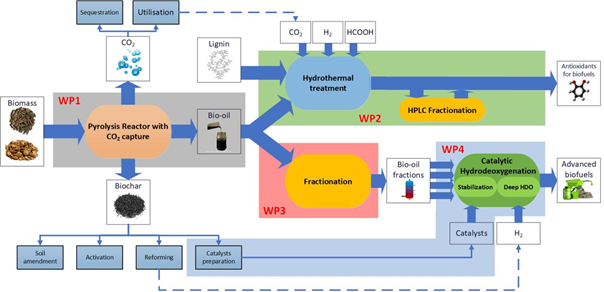
- Start date: 10/2021
- End date: 31-12-2024
- Coordinador: Jesús Arauzo, José Luis Sánchez
- Tipo: —
- Funding: 290.000 €
The European Union is seeking to boost the use of renewable fuels and materials, and specifically the use of biofuels, with the ambitious target of full decarbonization by the mid-century. The recently enacted Renewable Energy Directive (UE)2018/2001 sets a contribution of renewable energies of 32 % of the gross energy consumption in UE by 2030, being the contribution of the so-called advanced biofuels and biogas (produced from several residues or raw materials not apt for human food consumption) of at least 0.2 % in 2022, reaching at least 3.5 % by 2030 in the transport sector. Increasing the biofuel share of the transport sector from 3 % (2016) to 20 % (2050) would suppose a fivefold increase in the biofuel production from the 2016 level up to 650 (American) billion liters in 2050. Sustainability in the production and use of biofuels is a key point, stressed in the aforementioned directive as well as in previous directives such as the Fuel Quality Directive (2009/30/EC) and the Directive to reduce indirect land-use change for biofuels and bioliquids (EU2015/1513). Thus, the C of biofuels must not only come from renewable sources, but also must ensure its sustainability, not coming from food sources nor diverting the use of food cropland to fuel production, and being CO2 neutral or, ideally, negative in carbon footprint.
The general objectives of this project are to obtain biofuels for transportation, and, in particular, for aviation, and additives for biofuels from pyrolysis bio-oil of residual biomass. For its production, it is intended to use a process that incorporates several novel aspects, such as the use of an autothermal pyrolysis process with the production of a pure CO2 stream (apt to be used for C capture), biochar as an additional product with C capture, and advanced biofuels and additives to improve the oxidation stability of biodiesel, by using a process based on fractionation, depolymerization, and hydrotreating. One of the topics that is receiving a great share of attention is the production of sustainable aviation fuels, where the C in the fuel is not only from the non-fossil origin, but its complete production warrants sustainability. Thus, in this proposal the production of aromatic and cycloalkanes from the lignin part of residual biomass is sought, by a process that allows the capture of part of the renewable C as CO2 and biochar, making the products negative in carbon footprint.
Using bio-oil with this aim faces as the main problem the great heterogeneity in its composition, with the presence of a great variety of functional groups (carbonyl, carboxyl, aliphatic OH, phenolic OH, ketonic, ether, ester, ), which form part of light molecules as well as of oligomers, and an oxygen content (~35%) that is not allowed in drop-in fuels. In this project, a two-dimensional fractionation process applied to the bio-oil based on molecular weight and chemical affinity, with the aim of obtaining homogeneous fractions in both chemical nature and molecular weight, for fine-tuning catalysts and operation conditions allowing a more efficient conversion to the desired products.the desired products.
